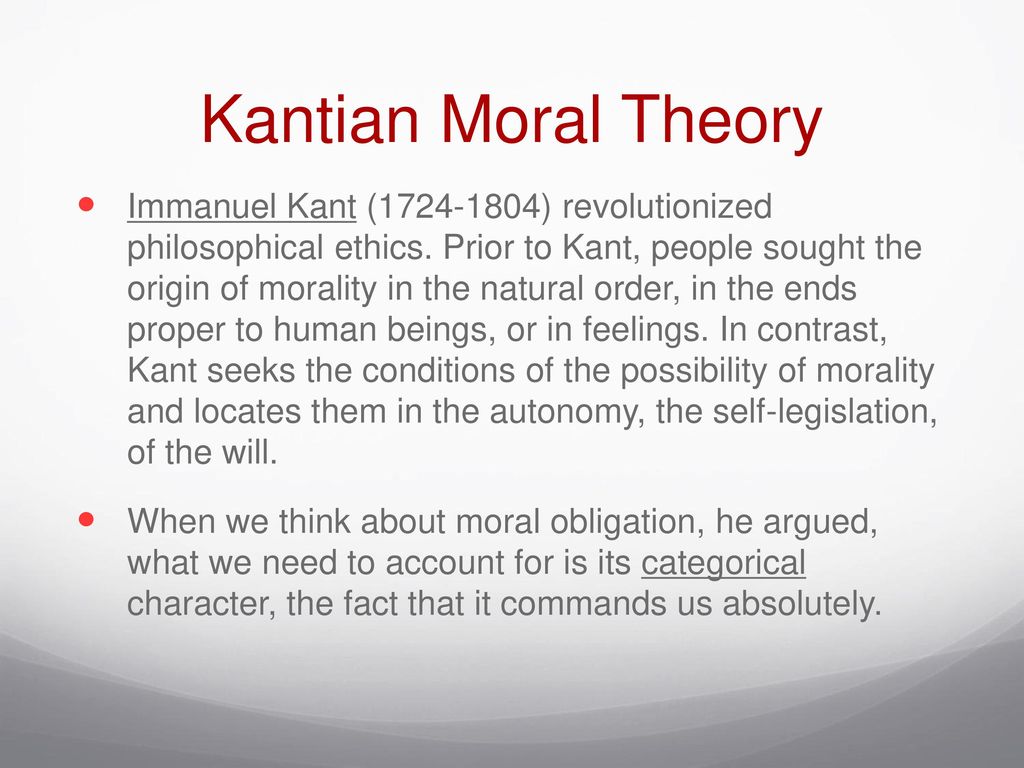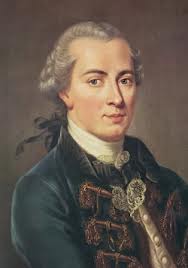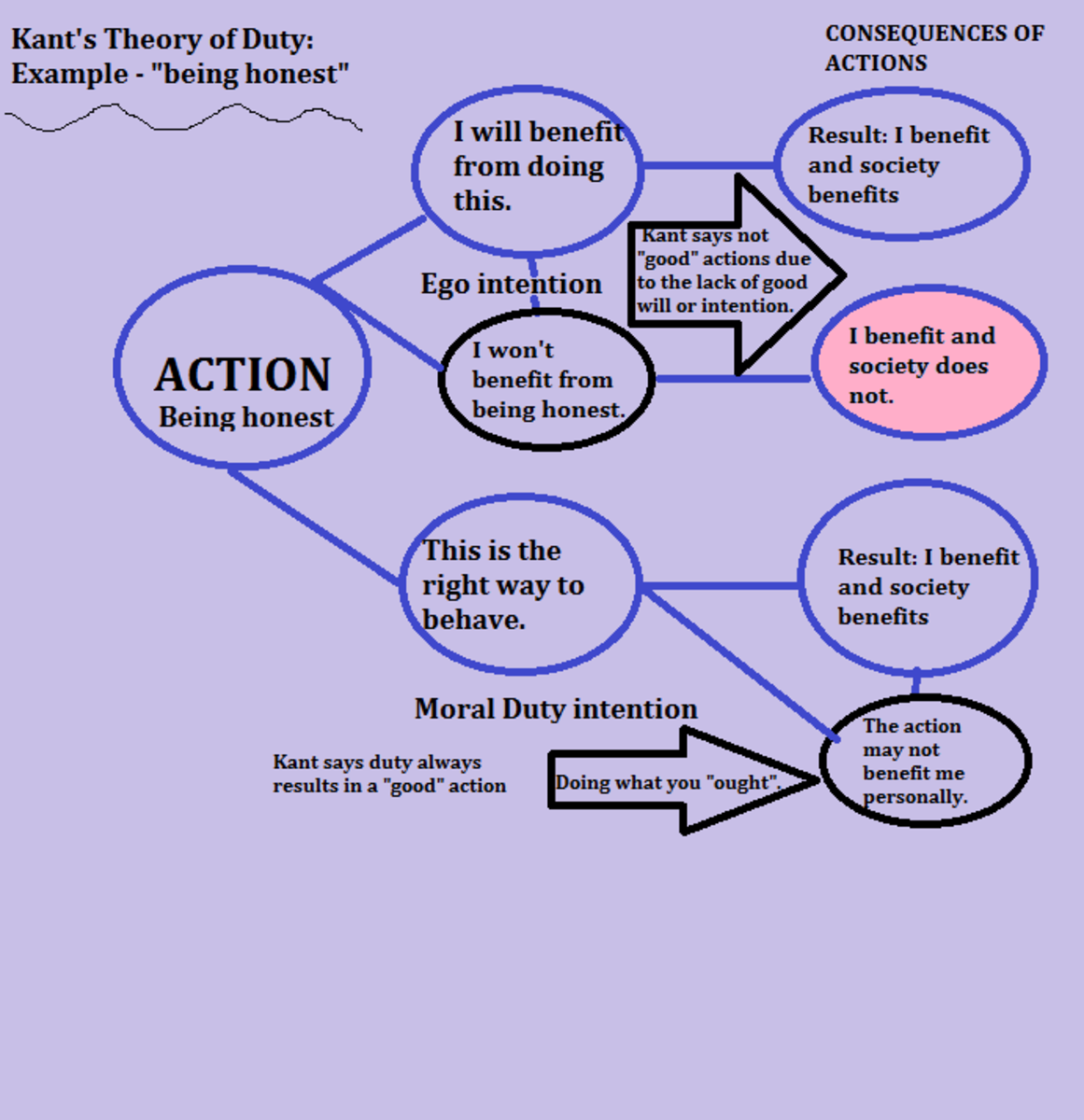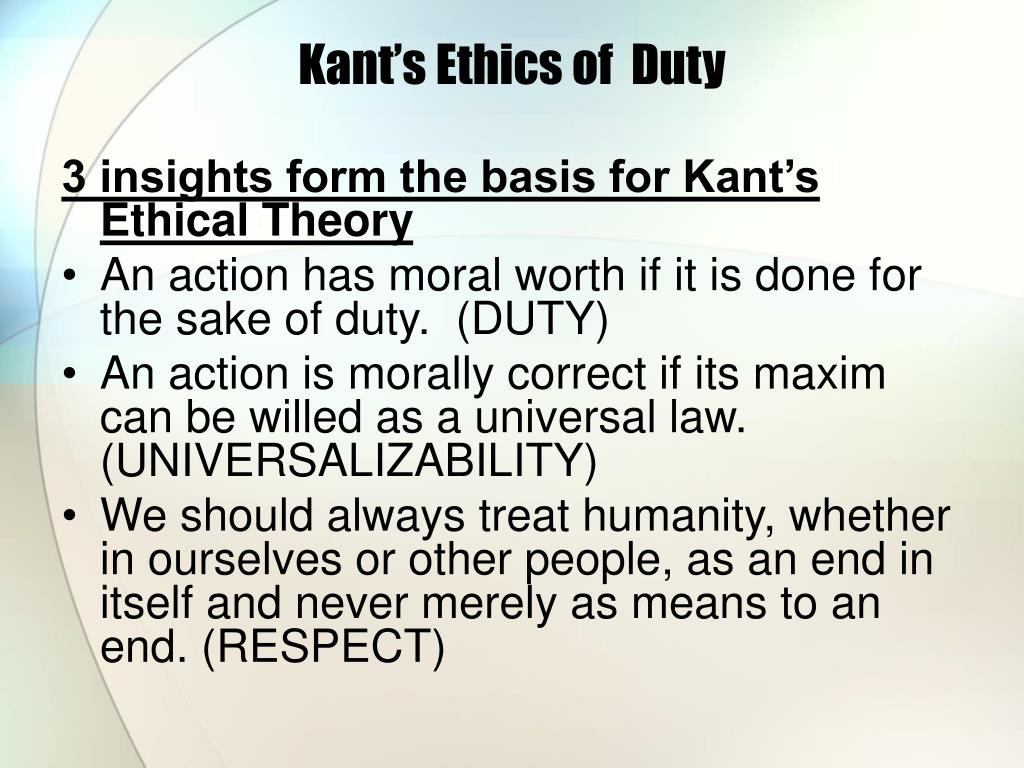Immanuel Kant 1724-1804Immanuel Kant was German philosopher born in Konigsberg Prussia now Kaliningrad Russia whose philosophy flourished around 18th century. The theory cannot resolve conflicts between duties.

Ethical Theories Deontology And Teleology Ppt Video Online Download

Kantian Moral Theory And The Liberal View Of Sexual Morality Ppt Download

Kantian Duty Based Deontological Ethics Seven Pillars Institute
Professor Elizabeth Anscombe 1920-2001.

Kant's ethical theory. Kants project has been to develop the full argument for his theory about the minds contribution to knowledge of the world. Kants theory of the absolutely good will thus depends upon the assumption of the a priori moral law within the individual person. Onora ONeill simplifies Kants moral theory through the Formula of the End in Itself which is acting in such a way that treats humanity as an end as opposed to a mere means.
It must stem from and respect the autonomy of rational beings These three formulations are all aspects of the Categorical Imperative. The best way to understand Kantian Ethical Theory KET is to grasp Kants objections to UET. Immanuel Kants ethical theory is deontological.
Hypothetical Oughts are in the form of a conditional while Categorical Oughts are not--they are unconditional. He says that the motive or means and not consequence or end of an action determines its moral value. 22 Bundle Theory of the Self David Hume From A Treatise of Human Nature Book I.
Of the sceptical and other systems of. Kants comprehensive and systematic works in epistemology metaphysics ethics and aesthetics have made him one of the most influential figures in modern Western philosophy. From the Greek this is the science of duties.
However a second example of duty theory put forward by British philosopher William D. Kants famous formula for discovering our ethical duty is known as the categorical imperative. While moral theory does not invent morality or even reflection on it it does try to bring systematic thinking to bear on these activities.
Kants Categorical Imperative For an action to be a moral action 1. Kant pursues this project through the first two chapters. 22 April 1724 12 February 1804 was a German philosopher and one of the central Enlightenment thinkers.
The theory applies only to rational agents. He sees moral duties as unchanging laws for human conduct. Substantive revision Fri Feb 5 2021.
ɪˈmaːnueːl ˈkant -nuɛl -. Leading 20 th century proponent of Kantianism. Deontology comes from the Greek word deon meaning duty - in other words.
According to deontology there are certain absolute or nearly absolute ethical rules that must be followed for example the rule that we must respect peoples privacy and the rule that says we must respect other peoples right to make decisions about their own lives. These central aspects of his theory of individual moral choice are carried over to his theories of humanitys history and of ideal political organization. Kantianism Kantianism is a key version of the broader ethical perspective known as deontology.
Ancient Ethical Theory. Ethical obligations are the same for all rational creatures they are universal and knowledge of what these obligations entail is arrived at by discovering rules of behavior that are not contradicted by reason. 53 An Introduction to Kants Moral Theory.
Kant proposed that there are two kinds of Oughts which are distinguished by their logical form. This assumption however is a speculative. For the sake of this paper I shall make a quick review on Immanuel Kants theory of universalizability that centers around the discourse on morality.
Kant unlike Mill believed that certain types of actions including murder theft and lying were absolutely prohibited even in cases where the action would bring about more happiness than the. A good example would be Norman Bowies book Business Ethics. To use someone as a mere means is to involve them in a scheme of action to which they could not in.
German philosopher Immanuel Kant 1724-1804 was an opponent of utilitarianism. It must respect rational beings as ends in themselves and not as means only 3. Aims and Methods of Moral Philosophy.
Kants Definition of Morality. In some cases scholars attempt to use a single ethical theory to shed light on a topic or range of topics. Morally speaking Kant is a deontologist.
Kants ethical theory emphasized reason autonomy and a respect for the humanity of others. Kants duty theory is particularly unique since he proposes a single moral principle as our highest duty. If one is not free then one cannot be held responsible.
The most basic aim of moral philosophy and so also of the Groundwork is in Kants view to seek out the foundational principle of a metaphysics of morals which Kant understands as a system of a priori moral principles that apply the CI to human persons in all times and cultures. K ɑː n t German. Ancient moral theory however.
A Kantian Perspective A more typical approachone taken by many business ethics textbooks todayis to attempt to use insights from various ethical theories to shed light on different aspects of a particular problem. Once that theory is in place we are in a position to see the errors that are caused by transgressions of the boundaries to knowledge established by Kants transcendental idealism and empirical realism. It must be amenable to being made consistently universal 2.
He did not attempt to prescribe specific action but instructed. First published Tue Aug 3 2004. It would not apply to non-humans or to humans who are not rational eg humans with brain malfunctioning illness or persistent vegetative coma.
Kants moral philosophy is a deontological normative theory which is to say he rejects the utilitarian idea that the rightness of an action is a function of how fruitful its outcome is. The contingent will can be subjected to the absolute will. Of the understanding Part IV.
Immanuel Kants take on ethics stands out in stark contrast to the utiliarianist views of Jeremy Bentham. He claims that actions are only morally right when they are done out of duty. Ross 18771971 sets forth a collection of several moral rules that.
He believes that morality is derived from the ability to think rationally which enables beings to be free. An ethical theory that is committed to normative individualism has to do justice to this claim. For Kant morality is not defined by the consequences of our actions our emotions or an external factor.
PROBLEMS WITH KANTS THEORY 1. Although all of Kants work develops his ethical theory it is most clearly defined in Groundwork of the Metaphysics of Morals Critique of Practical Reason and Metaphysics of MoralsAs part of the Enlightenment tradition Kant based his ethical theory on the belief that reason should be used to determine how people ought to act. His categorical imperative is a deontological ethical theory which means it is based on the idea that there are certain objective ethical rules in the world.
Between two perfect duties. K æ n t US.

Immanuel Kant And The Categorical Imperative For Dummies Owlcation

What Is Kantian Ethics Philosophical Definitions Youtube

Emmanuel Kant Ethics
Kant S Ethical Theory Duty And The Categorical Imperative Teaching Resources

Ppt Kant S Ethics Of Duty Powerpoint Presentation Free Download Id 342170

Pdf Can Positive Duties Be Derived From Kant S Categorical Imperative
2

Kantian Ethics Theory By Immanuel Kant Morality Is Based On Reason Not Emotion Therefore What You Intend And Why Is The Important Focus Good Intentions Come From Good Will The Use Of

